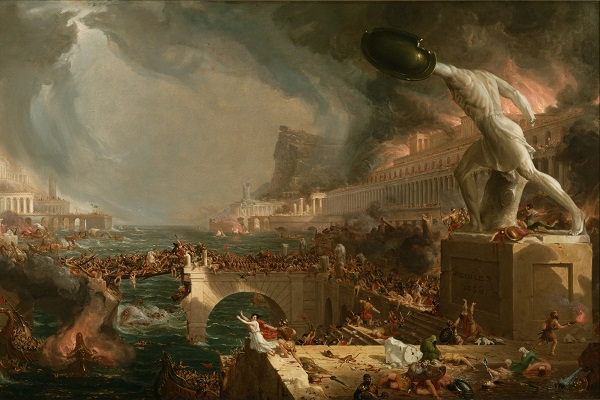
–>
April 13, 2023
For Americans who cherish self-government, free speech, and personal liberty, the reality of today’s America is jolting. How can Hillary Clinton’s campaign, Barack Obama’s FBI, and an assortment of sordid Intelligence Community actors conspire to frame Donald Trump as a Russian spy in a veritable coup d’état without suffering any legal consequences? How can the IRS target Americans for their political viewpoints and be rewarded with bigger budgets and more armed agents? How can the FBI illegally spy on a presidential campaign, target parents concerned over the content of their children’s public education, and label half of America “extremists,” and not be disbanded? How can the Department of (in)Justice seek to punish Americans’ speech and religious faith as impermissible expressions of “hate” and deprive Americans of their Second Amendment protections without being immediately defunded as a threat to the Bill of Rights? How can the State Department lecture regimes around the world about violently quelling political dissent and violating human rights when thousands of Americans who protested for fair elections have been persecuted as “insurrectionists,” denied impartial justice, and imprisoned for having “incorrect” beliefs? These are not the actions of any “free” nation and are shockingly antithetical to America’s foundations in liberty.
‘); googletag.cmd.push(function () { googletag.display(‘div-gpt-ad-1609268089992-0’); }); }
From this perspective, it seems apparent that the American government has not so quietly declared war on the American people. Why? Because it has abandoned any effort at preserving the qualities of its charter that once distinguished the American system as “exceptional” from all others — chiefly its constitutional framework empowering individual citizens and states while severely limiting centralized authority from ever infringing Americans’ inalienable rights and liberties. This idea — that legitimate political power can arise only from the people — had been an invaluable guardrail for keeping governing excesses, if not outright tyranny, in check. The steady erosion of this principle over the last century and its replacement with the age-old fallacy that “might makes right” have squandered American exceptionalism and invited tyranny to return through the front door.
Why has this happened? The simplest answer is that government — regardless of form — will always put its own interests ahead of those it claims to govern. Monarchs, despots, oligarchs, and republics all profess to legitimately represent the people, but should the people disagree, they will be accused of treason. No matter how “democratic” a government pretends to be, it will pursue its own survival at the expense of those it promises to protect. Politicians may feign obedience to the will of the people, but it is the people who will be forced to obey.
Power, once obtained, is not relinquished voluntarily. A federal government that has expanded in both size and authority well beyond anything the Founding Fathers conceived will not cut its own workforce, strip itself of powers stolen from the people and the states, rein in exorbitant tax and spend policies, or submit to constitutional checks and balances long since discarded. A national security surveillance State will not publicly admit that its obscene domestic spying network violates the heart of the Fourth Amendment’s prohibition against warrantless searches. An increasingly all-pervasive regulatory system that gives government partial ownership over all private property will not soon choose to mind its own business. An unethical partnership between vote-buying politicians and money-printing central bankers will not be jettisoned simply because currency manipulation and profligate overspending have destroyed America’s once-robust middle class. Government is in the problem-creation business; only a resilient and determined public can force the government back to proper size. That gargantuan task, however, gets only more burdensome by the day.
‘); googletag.cmd.push(function () { googletag.display(‘div-gpt-ad-1609270365559-0’); }); }
It cannot be stated too often: the most important conflict of our times is that between individual liberty and State control. National borders, constitutional constraints, legal norms, respect for inviolable rights, and concern for civilian autonomy are evaporating. Centralized and expansive government control over domestic and foreign populations — without much recognizable distinction separating those two groups — is the State’s raison d’être. People are disposable game pieces for conniving governments to use and abuse. Call it the implementation of a “new world order” or the “Great Reset” or the West’s “Build Back Better” mission to erect a global government with totalitarian-like control, but however it is named, its purpose is nothing less than a war on personhood. State-sanctioned groupthink will replace free thought; regulated speech will replace free expression; redistributed wealth will replace private property. The West has, in effect, declared war on its own foundations.
The problem with wars of any kind — aside from the justification of moral atrocities — is that they take on lives of their own and develop wants and needs independent from — and sometimes even antithetical to — the original reasons for their outbreak. In the aftermath of WWII, the Cold War unleashed a global espionage era that has never abated. An “Us/Them” dichotomy originally distinguishing Western freedom from communist oppression created a permanent state of aggression in which any manner of untoward conduct could be justified as the price for victory. Mass propaganda, hybrid warfare directed at destabilizing economies and producing social unrest, and widespread systems of surveillance became the norm in foreign operations — programs whose implementation at home would have been rightly understood as monumental threats to freedom.
While this devastating Cold War stew bubbled, however, the world became more interconnected than ever. The internet made neighbors out of distant strangers and magnified the proliferation of once isolated points of view. Online commerce connected market partners from around the world. Barriers to shared knowledge came crashing down. In the process, this profound technological upheaval complicated modern warfare: while the spread of free markets, free speech, and free thought reduced governments’ capacity for social control, the disappearance of clearly delineated borders separating East from West made it impossible to engage in mass propaganda, hybrid attacks, and widespread surveillance without implementing those same measures against a government’s own citizens. Because spies and intelligence agencies value effectiveness over virtue, they rarely prioritize their nations’ most cherished beliefs. Institutions with great power may purport to act on behalf of the public, but they are fielded with agents who first do their agency’s bidding.
If America today feels less like a free country and more like an eavesdropping system run by the NSA, CIA, FBI, and other espionage agencies, that’s because it is. With eyes and ears wide open, just as during the Cold War, hypocritical Western victors squandered freedom for East German surveillance.
The flashpoints of the last few years — COVID-justified mass surveillance and regulatory expansion, Washington’s use of the “rules-based international order” to conduct economic warfare abroad, U.S.-NATO’s barely concealed military engagements with Russia, Western trade bloc maneuvers against China, the World Economic Forum’s “green”-energy-induced inflation, and the U.S. dollar’s growing fragility — are either calculated strategies meant to expand Western government power while weakening personal rights and freedoms or the natural consequences of putting those strategies into motion. In this Risk-type game for global domination where citizens’ minds are an integral part of the battlespace, there is no such thing anymore as a noncombatant. Propaganda, information warfare, and psychological manipulation are rampant, and ordinary people are under constant attack — whether they realize it or not.
When ordinary citizens lose control over institutions, those institutions gain control over the people. Western politicians pay lip service to public ideals, while Western institutions act independently from — and often in defiance of — the public’s wishes. This is why Western domestic and foreign policies appear so schizophrenic today. It is why Americans who adore freedom instead find increasingly insidious forms of tyranny. And it is why Westerners who reject Soviet-style or Chinese forms of communism will be forced to stand against Western-style oppression, too.
‘); googletag.cmd.push(function () { googletag.display(‘div-gpt-ad-1609268078422-0’); }); } if (publir_show_ads) { document.write(“
My sincerest thanks and best wishes to Eric, Deborah L., and Mary M.

Image via Wikimedia Commons, public domain.
<!– if(page_width_onload <= 479) { document.write("
“); googletag.cmd.push(function() { googletag.display(‘div-gpt-ad-1345489840937-4’); }); } –> If you experience technical problems, please write to [email protected]
FOLLOW US ON
<!–
–>
<!– _qoptions={ qacct:”p-9bKF-NgTuSFM6″ }; ![]() –> <!—-> <!– var addthis_share = { email_template: “new_template” } –>
–> <!—-> <!– var addthis_share = { email_template: “new_template” } –>





